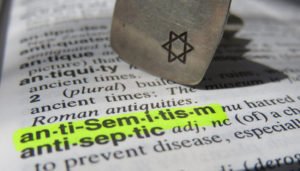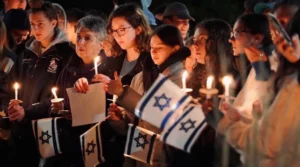
Philissa Cramer and Penny Schwartz
The creators of new Passover Haggadahs focused on Zionism and American patriotism were working on their projects long before Oct. 7, when Hamas attacked Israel and triggered a war in Gaza and a broad reckoning over both Israel and the place of Jews in the United States.
Now, the Haggadahs arrive at a time when the crisis is certain to be a looming presence at seder tables across the Jewish world when Passover begins on the evening of April 22.
A range of Haggadah supplements focused squarely on Oct. 7 have become available in recent weeks, as Jewish leaders aim to help families talk about the attack and its aftermath during their seders.
But the Haggadah marketplace goes far beyond the moment, and not all of the new entrants to the seder scene this year are so serious: There are also parody Haggadahs inspired by Star Wars and the Jewish filmmaker and comedian Mel Brooks, as well as two new books designed for families with young children and new efforts from longtime suppliers of Jewish ritual texts.
Here are 10 Haggadahs to freshen up your seder this year or in the future.
For American patriots
Exactly when the traditional Haggadah text was finalized isn’t known, but it was at least 1,400 years before anyone featured in “The Promise of Liberty: A Passover Haggada” was even born. The book — by two history buffs, Yeshiva University official Rabbi Stuart Halpern and health care executive Jacob Kupietzky — draws parallels between the Exodus story and the founding of the United States. It also includes examples of Americans over time who have taken inspiration from Moses, including Harriet Tubman, who led enslaved Black people to freedom through the Underground Railroad.
For the Zionist — or the doubter
Marvin Chinitz, a physician in suburban New York City, first envisioned a Haggadah focused on the modern state of Israel because he was dissatisfied with the Israel education at his children’s Jewish day school. “The Chinitz Zion Haggadah” arrives at a time when Zionism is perhaps more hotly contested than ever before, with the Israel-Hamas war triggering both vociferous pro-Israel and anti-Israel activity. The book contains both the traditional text and commentaries that aim to “transform the connection of our seder from the story of God and the Israelites to the story of God and modern Israel.” Chinitz says he sought to keep the book apolitical, opting for questions over didacticism and believes the book could be especially helpful for brokering a peaceful seder for families — like his own, he says — where not everyone identifies as a Zionist.
For those who want to incorporate Oct. 7 into their seder
This year’s Passover will be the first since the Oct. 7 attack on Israel reshaped the Jewish world. A range of supplements aims to shape and ease the way the trauma is reflected at the seder table. One, in Hebrew, was produced by Israeli rabbis, some with a connection to the crisis. Another came from rabbis at the nondenominational Academy for Jewish Religion in the United States, while the Reform movement has released its own. And anyone who has picked up the Kveller Haggadah from our families-focused sister site over the last four years since it was published will want to sign up to get the Oct. 7 supplement with seven ways to address the crisis at their seders.
For visual storytellers (and Hebrew speakers)
An Israeli artist collective known as Asufa has for the last decade put out a Haggadah featuring colorful and sometimes edgy illustrations by a slew of up-and-coming artists. After a 10th anniversary edition last year that included English, this year’s version is back to all Hebrew. But some of the images, including ones that show a soldier and his wife embracing and Red Cross ambulances bringing freed hostages back to Israel, reflect this year’s collective traumas — and that needs no translation.
For fans of a ‘Darth Seder’
From the author of Haggadahs about emojis, Seinfeld, Shakespeare and COVID-19 comes a new one for anyone with a passion for Star Wars, the sci-fi franchise that has populated film, television, gaming and merch for nearly 50 years. Martin Bodek is a historian of the Haggadah, and his new “This Haggadah is The Way: A Star Wars Unofficial Passover Parody” preserves the traditional text but has fun with the English translation, referring to matzah as “polystarch puffbread” and asking, “Why is this galaxy different from all other galaxies?” Bodek omitted any footnotes to help readers understand the allusions, writing, “Either you’ll catch my blitz of references because of your extreme nerdery, or you’ll look it up because of your excessive dorkery. If you can’t or won’t do either, then this isn’t the book you’re looking for, now is it?”

For Mel Brooks fans
Another spoof Haggadah comes from Dave Cowen, who has pilloried “Seinfeld,” Kanye West and the last two U.S. presidents in his previous outings. This year’s Mel Brooks-inspired version doesn’t aim to stand alone at the seder table, but it does include parts for Brooks — who speaks as Moses, whom he played in “History of the World Part I” — and his frequent comedy collaborators, including Carl Reiner and Gene Wilder. The zany text also grapples with current events, sketching out a debate among comics about the propriety of a cease-fire in the Israel-Hamas war and alluding to declining support for Israel among younger demographics. “Can we at least try to come up with something, a parody song ‘Karpas for…’ based on ‘Springtime for Hitler,’ that would satisfy both sides of this political and generational divide?” the Wilder character asks.
For families seeking contemporary resonance
Two rabbis who penned “An Invitation to Passover” have teamed up again for an inspiring family Haggadah that brings the seder into contemporary times. Sprinkled throughout the traditional narrative, Kerry Olitzky and Deborah Bodin Cohen’s “The Heroes Haggadah: Lead the Way to Freedom” showcases dozens of Jewish heroes from all walks of life — Ruth Bader Ginsburg; Anat Hoffman, the Israeli gender-equality activist; Volodymyr Zelensky; Jewish NFL star Julian Edelman; Rabbi Angela Buchdahl, the first Asian American rabbi, and Gershom Sizomu, the chief rabbi of Uganda’s Jewish community. Global Jewish recipes include several from Michael Twitty, author of “Kosher Soul,” and Groucho Marx’s matzo balls.
For a fresh spin on a classic for kids
More than two decades after its first publication, Rahel Musleah’s richly illustrated “Why On This Night: A Passover Haggadah for Family Celebration” has been reissued. It now boasts a colorful new cover by Louise August and updated sections to keep it fresh and full of customs from across the globe. The lyrically written abbreviated Haggadah includes Hebrew and English translation and transliteration. There’s fun to be had with a short play, songs and recipes, including a new one for Turkish tishpishti, a Sephardic nutcake.
For human rights enthusiasts
Interested in discussing workers’ rights, prison labor or reparations during the seder? Consider “The Human Rights Haggadah,” by Shlomo Levin, who holds both Orthodox rabbinic ordination and a master’s degree in international law from the United Nations’ University for Peace in Costa Rica. The text includes classic Jewish sources on human rights issues, information about international law and explorations of how human rights and Jewish values intersect.
For a new classic
The bentcher, or songbook, released by Yedid Nefesh more than a decade ago has become a classic at weddings and Shabbat tables. Now, the imprint, under the direction of Rabbi Joshua Cahan, has released its first Haggadah. At $18, the Yedid Nefesh Haggadah is designed for mass use and comfort at the seder table. Including both brief commentaries and transliterations for most of the seder text, the Haggadah aims to be equally accessible for experienced seder-goers and those who are fresher to the ritual.






 Juan Melamed
Juan Melamed
 Philissa Cramer
Philissa Cramer

